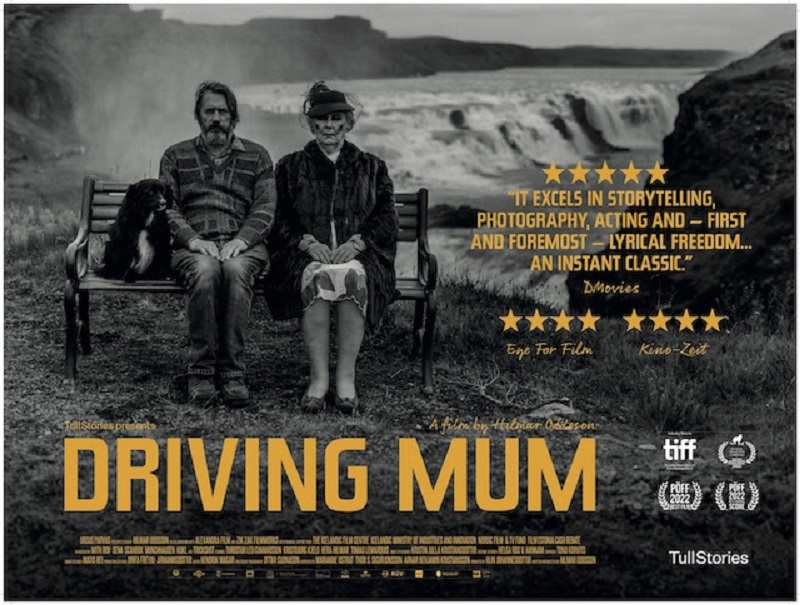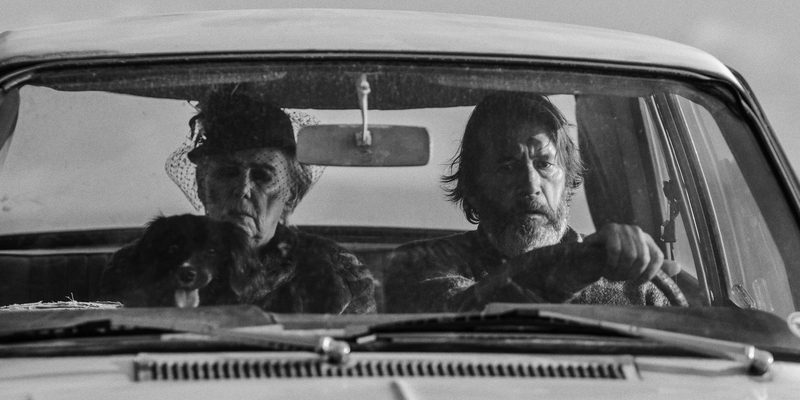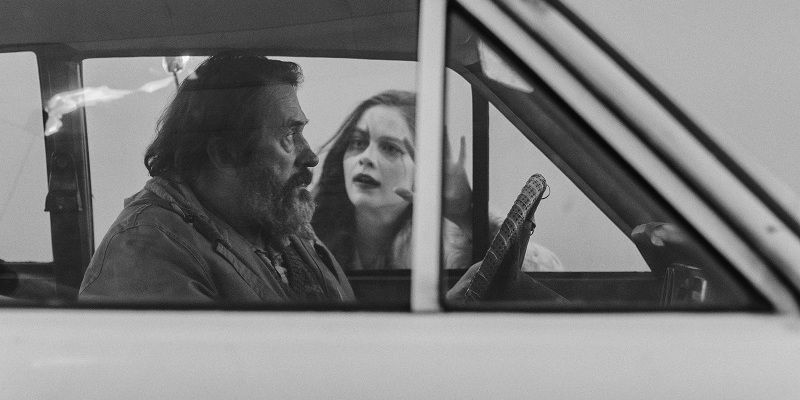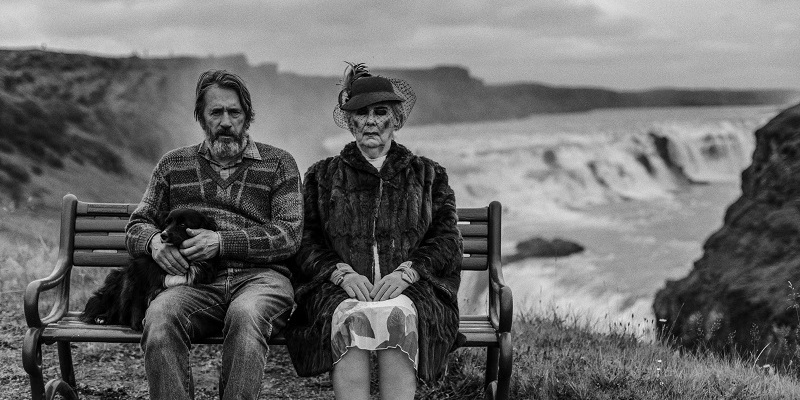
Review by
Benjamin Poole
Directed by: Hilmar Oddsson
Starring: Þröstur Leó Gunnarsson, Kristbjörg Kjeld, Hera Hilmar, Tómas Lemarquis

You can't lose with a film located in the remoter regions of Iceland. A
monochrome landscape of soft snow and hard pyroxene, amidst thick plains
of barley and wheat that are alongside fjords as deep and cold as darkness
itself, all right up there at the top of the world. "Oh Alfadir, take me
there’," your beleaguered urbanite soul sighs as you watch the opening
frames of Hilmar Oddsson's singular black comedy,
Driving Mum. The longing intensifies as we pan across to a ramshackle small holding,
wherein - and this is the killer cosy - an elderly lady and her adult son
sit actually knitting as they listen to the radio. Talk about the bliss of
solitude. And they've got a dog, too (name of Brezhnev, in an early
indicator of this film's pleasingly weird humour and '80s period setting).
Is this not the aspiration, the yearning we console ourselves with to get
through the relentlessness of another day: space, freedom, being away from
it all? Namm namm.

It's a utopian ideal, perhaps. Yet, as we come to realise, the isolation
which Jón (Þröstur Leó Gunnarsson) and Mamma (Kristbjörg Kjeld) enjoy is crushingly immaculate: broadcasts will not reach the farm, so
the radio shows which they listen to are taped on the mainland by a
contact and delivered in bulk via boat every week. The tiny family are not
only secluded from the world, but out of sync with time, too. Weather
reports are from uselessly earlier in the week and the news is
yesterday's. "We're not really going anywhere now, are we?" Jón
impassively observes. Still, at this point in their existence, at this
distant station in life, at least son and mother have each other. But, as
another film located on an unlikely island maintained, life, or to be more
precise, death, finds a way and overnight Mamma slips away to Andlang.
This is the narrative trigger for Jón to drive away from the shack in
order to reluctantly honour Mamma's final wishes: to be buried in her
birth village of southwest Eyrarbakki and that Jón should not remain in
the Westfjords eking out a solitary existence. Firing up his Mercedes 200
series (if my googling is correct... by the by, searching up cars in
Iceland turns out to be a fascinating rabbit hole - with a suggestion that
Russia would dump job-lots of automobiles as trade for fish, etc; a
proposition borne out by the random nature of vehicles Jón encounters in
his ensuing road trip, another otherworldly aspect of this ethereal
movie), and with Mamma seatbelted upright in the back, Jón embarks on a
picaresque of if not of discovery, but necessity. If it was up to him Jón
(lazy, passive), would stay in the lakeside shack until he too went the
way of his mother. Yet as Mamma and Driving Mum suggests,
isolation is not the natural way of people, who need and thrive upon
connection with others.

And thus, along the journey Jón meets characters of varying comic
peculiarity, all the while chastised by the beyond the grave voice of his
mother, literally and figuratively backseat driving her son who has
internalised Mamma as a coping mechanism. Driving Mum's presentation of expiry is comically blunt, but fittingly so, mindfully
respectful of the cruel farce that is death (it is ridiculous that one day
you're knocking about liking something on Twitter and the next you just do
not exist. You have to laugh, I suppose). When Mamma passes, the
atmosphere is gently mournful, and Jón is heartbreakingly stoic. Smash cut
to his subsequent attempts at post-mortem make-up: the full-on Baby Jane
pancaked grotesquery. As ever, with its humanity, humour and deep love,
the antidote to death is life going on.
Speaking of which, one of the figures - along with other lonely farmers,
hitchhikers, angry Germans - which Jón repeatedly encounters along his
journey is a woman of around 20 years his junior, whom the film implies
Jón recognises. Bergdís (Hera Hilmar) is a lost love from Jón's
past, and, just like the censorious intonations of his mother, is another
figment of his imagination. Via the figure of Bergdís, glimpsed smiling
from across the road or in the window of a passing bus,
Driving Mum relates a masculine mid-life crisis, wherein
seemingly straightforward and effortless youth beguiles because it is not
the here and now, and Bergdís configures a replacement for Mamma: a
substitute companion and carer for Jón. Infatuation, the projection of our
fears and hopes onto another, culminates in a pitiless punchline
characteristic of this film, which is completely generous in its humanity,
yet realistic about our foibles (to whit, there is a roadside cabaret
sequence set to Yes Sir, I Can Boogie, one of the world's most hopelessly
sincere yet amazingly ludicrous songs).

Usually, I fucking hate films which are based upon the trope of a
mismatched couple forced to travel a long distance in a car together (it
is difficult to accept that those sorts of circumstances would be
conducive to hard won mutual understanding, plus driving is boring because
you can't read or drink doing it), but Driving Mum -amusing,
moving, surprising- is a beloved exception. With typical narrative
absurdity, Jón ends the film in perhaps the most opposite environment to
where he begins, but happily so, enjoying the relationships that he
didn’'t realise would fulfil him. No man is an island,
Driving Mum suggests, and nor should he live on one.

Driving Mum is in UK cinemas from
March 1st.

